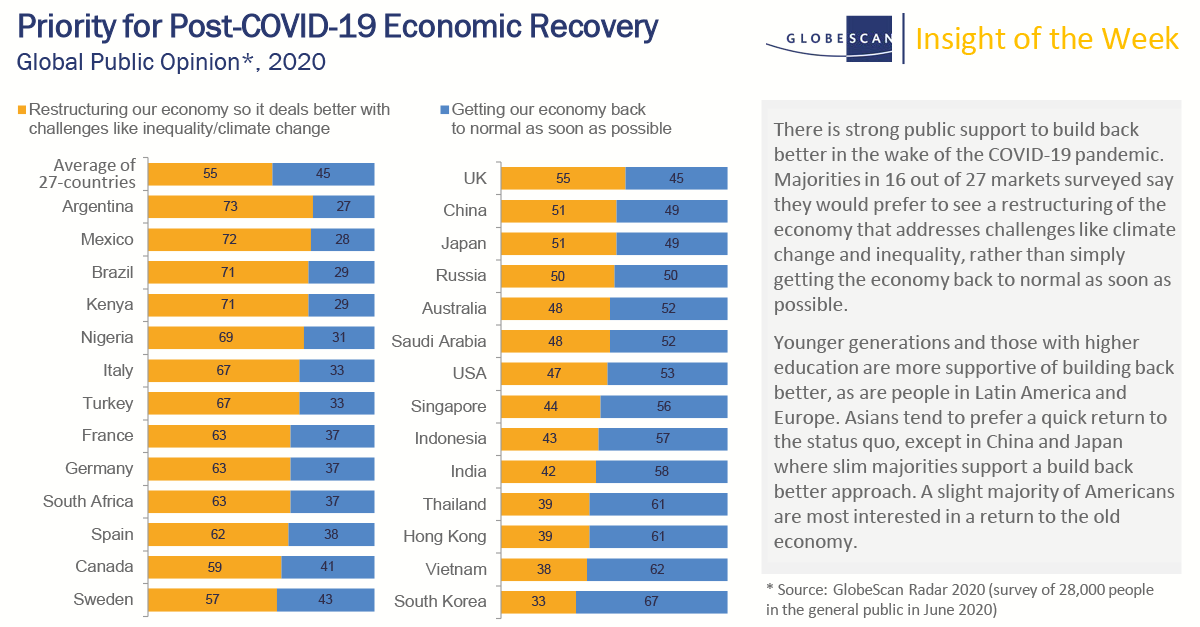Some new planetary maps of feeling: majorities want to "build back better" from Covid, and cultures shift around "survival" and "self-expression"
Some interesting global public opinion/values surveys this week. First from Globescan, on building back better after Covid (download here, see graphic above).
This records strong majorities in major countries across the world - yes Europe, but also strong showings in Africa and South America - whose experience of Covid has been so shocking they’re looking to use it as a spur to reform and strengthening, facing inequality and climate change.
Interesting that in South East Asia (with exception of Japan and China), there’s a big desire to get back to the status quo (perhaps showing that these societies were already factoring in superbugs and epidemics, from previous experience).
Below is another snapshot, but based on a long-standing form of measurement - the idea of a “world cultural map”, devised by the famous charter of the rise of “post-materialist” values, Ronald Inglehart.
In this blog, the authors explain what’s going on with the vertical and horizontal axes, at least:
Survival values versus Self-expression values. The global cultural map shows how scores of societies are located on these two dimensions. Moving upward on this map reflects the shift from Traditional values to Secular-rational and moving rightward reflects the shift from Survival values to Self–expression values.
Traditional values emphasize the importance of religion, parent-child ties, deference to authority and traditional family values. People who embrace these values also reject divorce, abortion, euthanasia and suicide. These societies have high levels of national pride and a nationalistic outlook.
Secular-rational values have the opposite preferences to the traditional values. These societies place less emphasis on religion, traditional family values and authority. Divorce, abortion, euthanasia and suicide are seen as relatively acceptable. (Suicide is not necessarily more common.)
Survival values place emphasis on economic and physical security. It is linked with a relatively ethnocentric outlook and low levels of trust and tolerance.
Self-expression values give high priority to environmental protection, growing tolerance of foreigners, gays and lesbians and gender equality, and rising demands for participation in decision-making in economic and political life.
More here. If you run the video below, you can see some interesting journeys across these axes, which started collating results in 1981:
Further down this blog, you can sample the World Values Survey’s interpretations of their own findings - which is generally that the more affluent a society is, the more it will lead towards “secular” and “self-expressive” values, overtime.
What is particularly intriguing about the values map - other than its vast colours of cultural boundaries (does “African-Islamic” really work as a pairing?) - is the vast unoccupied gap that exists in the “traditional” meets “self-expression” zone. Is it really the case that there are no “llberal-traditional” cultures?
What of the claims to tolerance, openness, ambiguity of identity, that one often hears about from indigenous cultures? What of the private lives that can be conducted even under regimes whose public face to the world is authoritarian?
One also wonders whether this opens up an activist space which could be filled by agri-innovators (permaculture, regenerative economics, etc) who want to slow down the material pace of modern life (to stay within planetary boundaries), but are culturally liberal in their values.


